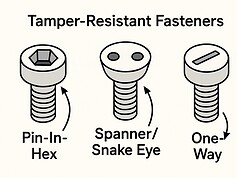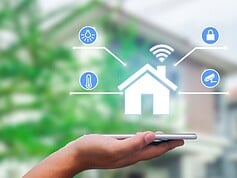
Thinking of how to keep your home office safe in 2025?
With 22.8% of US employees now working remotely, it’s more important than ever to consider your home office security. Now for some facts that might alarm you…
Why? Well the fact is, if you’re like most home offices then you are probably an easy target for a security breach.
It’s not just flexible schedules and no more commuting for remote work. It means that your home is now the frontline for both physical and digital security threats.
The good news is that you can and should secure your home office better than most office buildings with the right set up and tech.
Here’s a preview:
- Home Office Security Is More Important Than Ever Before
- Physical Security Measures You Can’t Ignore
- Digital Protection For Your Home Workstation
- Smart Tech That Works
Home Office Security Is More Important Than Ever Before
Your home office feels safe, right? You’re in your own space. Who cares about office break-ins or stolen laptops at a conference room?
WRONG.
Home offices face unique security risks and threats most workers never consider until it’s too late. But here’s the thing, with 94 million US households already using a home security system, people are starting to pay attention.
Here’s the real deal…
If you’re setting up your home office location and work space, consider that physical location is just as important as your internet connection. Your tips for setting up your perfect home office should always include security from day 1. This means thinking about where you put your desk, how you store sensitive documents and more.
And if you’re home-based with your own business?
Get a physical address from iPostal1 to keep your own home address private and use a legitimate business address. This simple step keeps your personal security private while maintaining professionalism.
Cost of getting this wrong? Data breaches now cost businesses an average of $4.88 million per incident. Small businesses and home offices are becoming a bigger target because the hackers know these places are an easier target.
Physical Security Measures You Can’t Ignore
Protect your home office with physical barriers. Leaving your laptop on the car seat with the doors unlocked is a crime waiting to happen.
Same rules apply to your home office space. Don’t make it an open target.
Secure Your Entry Points
Windows and doors near your work space should have appropriate locks. That’s obvious right? Most likely the first thing a burglar checks.
In fact, more than 52% of homes now have at least one security camera installed. Why? Visible security devices like cameras deter most criminals long before they make a move.
Get cameras at main entry points that are obvious to see. The goal here is not just catching thieves — but having them pick a different house to rob in the first place.
Lock Down Your Equipment
Physical device security is as important as your passwords. Lock down your devices to keep them safe.
Use cable locks on laptops and monitors and keep external hard drives in locked drawers.
If a criminal can physically access your devices, all your digital security is worthless.
Create A Separate Work Zone
Not leaving your laptop out on the kitchen table and calling it an office.
Designate a specific work space that can be secured. Makes access and security much easier to control and manage.
Digital Protection For Your Work Setup
Physical security is step one. Most home offices really let the side down when it comes to digital protection.
Remote workers are juicy targets for cyberattacks and hackers. Why? Home networks tend to have less security than corporate networks.
Start With Your Internet Connection
Don’t use public WiFi for work, even at home. Even your own home network needs serious protection.
Change the default password on your router immediately. Use WPA3 security and a guest network for anyone else connecting to your home WiFi.
VPN is your friend here. Encrypt your internet traffic so it’s harder for hackers to intercept and access your data.
Update Everything Regularly
Software updates. Ugh. Everyone hates those popups that can’t seem to go away.
But they fix security vulnerabilities that hackers know about and are actively exploiting. Auto-update everything if you can. This includes everything from your operating system, antivirus software, web browsers, and all your work related applications.
Use Strong Authentication
Passwords alone just don’t cut it anymore.
Enable multi-factor authentication on everything that offers it. This way even if a hacker steals your password they still can’t access your accounts.
Use a password manager to create and store unique strong passwords for all accounts. Reusing passwords is like using the same key for your house, car, and office.
Smart Tech That Works
Smart technology that actually works and makes your security easier instead of more complicated
Smart Locks And Access Control
Smart locks give you control over who enters your home office area. You can give temporary access without handing out a physical key.
Some models even track who enters and when, creating an audit log for both security and business reasons.
Motion Sensors And Smart Lighting
Motion lights deter intruders and alert you to unexpected activity.
Put these on key entry areas and connect to your smart home system so you get alerts if motion is detected.
Smart lighting also helps create an impression that someone is home even when you are away.
Integrated Security Systems
Combine cameras, sensors, alarms and smart locks all integrated into one platform that you control from your phone.
ADT and Ring are the two most popular systems available.
Cloud Backup Solutions
Security isn’t just about stopping theft. It’s also about data loss from disasters like fires, floods or equipment failure.
Automatic cloud backups make sure your work is always backed up. Have more than one solution so you have at least 1 local and 1 cloud based.
Essential Security Habits To Develop
Technology is only part of security. I need good habits too.
Shred sensitive documents before throwing them away. Identity thieves look through trash to steal information.
Lock your office door when you leave the house. Yes, even if you live alone, make this a regular habit.
Think before you share on social media. Posting about your home office and set up tells thieves when your home is vulnerable.
Keep work and personal devices separate. Don’t browse the internet for personal stuff on your work laptop. Limits risk if one device is compromised.
Final Thoughts
Home office security doesn’t need to be complicated or expensive. Start with basics of securing physical space and digital assets. Layer on smart technology to cover any gaps.
Make sure your tips for setting up your perfect home office always include security as a foundation.
Security protects your livelihood and your family’s safety. More than equipment or tools.
Small improvements stack and add up. Today maybe it’s just changing your router password. Or that security camera you’ve been putting off. One thing at a time and you’ll be well on your way to being serious about home office security.
The home office should be a productivity sanctuary, not a security headache.







